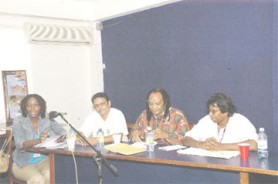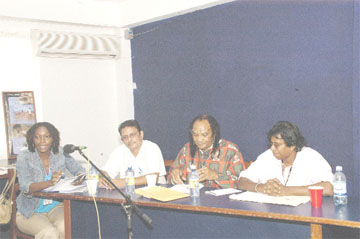– declines offer of conditional lease
The Malaysian-Guyanese forestry company UNAMCO is officially preparing to close down all its local operations after it refused to accept a recent offer made by the Government of Guyana to have its TSA renewed.
UNAMCO began its operations locally in 1994 after buying the majority shares in a local timber company. The Malaysian company Tenaga Khemas and Guyanese company Case Timbers bought up the main shares of UNAMCO from a local businessman, who had been granted a 15-year Timber Sales Agreement (TSA) by the government in 1992 for a 237,000-acre concession. This businessman remained a minority shareholder in the company. With the purchase of the business, the new management took over the TSA which expired in 2007. Since then, the TSA had not been renewed.
While officials from UNAMCO were alleging discrimination by the government, the Guyana Forestry Commission (GFC) denied these claims and said that UNAMCO did not satisfactorily meet the terms and conditions of the previous agreement. According to the GFC, UNAMCO consistently fell short in production, while it racked up debts in royalties and acreage fees to the state.

However, in spite of these grievances, the government, through Minister of Agriculture Robert Persaud, recently indicated its willingness to allow UNAMCO to renew approximately 75,000 hectares of the previously leased concession.
In a letter addressed to the General Manager of the company Mr Jeyakumar, Persaud indicated that the consideration of the renewal was subject to several conditions. This included the submission of “a comprehensive investment programme with evidence of financing [which included a clearly defined operational plan of activities outlining proposed annual harvesting production over the next five years].” Other requirements included “a list of equipment and machinery to be purchased immediately to begin active operations in the concession as well as the employment policy [total projected number of expatriates by skills; the total number of Guyanese to be employed].” The company was also requested to supply “organizational charts showing the categories of professional, senior professional staff, proposed markets, social policy, community development strategies, and processing and other added value activities proposed for the period 2009-2013.”
In this letter, Persaud said the renewal of a leased forest concession, especially a long-term one, such a TSA, is determined by many transparent criteria, one of which is the level of compliance with the terms and conditions of the previous agreement. He said that according to the GFC, UNAMCO “did not satisfactorily meet these terms and conditions”.
In response Jeyakumar, on behalf of UNAMCO, declined the offer and said that the decision was based on several factors. According to the General Manger “after carefully evaluating all the various factors, we have determined that it is not economically viable for us to operate the proposed forest concession. We will continue to incur further heavy losses.”
Among the factors he identified as influencing this decision was the reduced size of the forest concession, which would result in a reduced Annual Allowable Cut. He said this was a major reason for declining the offer. The General Manager also identified “the five-year duration of the TSA instead of the normal 25 years, the high costs of maintaining the 118 km UNAMCO road and other infrastructures” as reasons for declining the offer.
In his correspondence, Jeyakumar requested that the company be allowed a period of six months to remove its equipment and other assets from the UNAMCO Forest Concession in pursuance of Clause 11 of UNAMCO’s TSA. Persaud has since instructed the GFC to invoke this clause.
UNAMCO had complained that while it was waiting for the government to renew its TSA, bandits had begun to raid its concession damaging valuable equipment and pillaging the trees.

